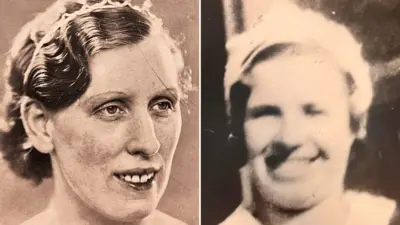We've updated our Privacy and Cookies Policy
We've made some important changes to our Privacy and Cookies Policy and we want you to know what this means for you and your data.
Ancient child grave was Africa's earliest funeral
Image source, Fernando Fueyo
- Author, Victoria Gill
- Role, Science correspondent, ด๓ฯ๓ดซรฝ News
A glimpse of human grief, at the loss of a child 78,000 years ago, has been revealed in the discovery of the oldest burial site in Africa.
The Middle Stone Age grave - of a three-year-old child - was found in a cave in Kenya.
In a paper, the researchers who studied the fragile, ancient remains described how its head appeared to have been laid on a pillow.
Scientists have named the child Mtoto, meaning "the kid" in Swahili.
Image source, Jorge Gonzรกlez/Elena Santos
The international team of archaeologists carefully cast the entire grave in plaster in order to preserve the arrangement of surviving bone fragments. This enabled them to transport the body safely to a laboratory for detailed study.
"It was like excavating a shadow," said Prof Marรญa Martinรณn-Torres, director of Spain's .
"[When we moved the cast], we didn't know we were carrying a child in our arms," she told the ด๓ฯ๓ดซรฝ's Inside Science programme.
The researchers were able to study the teeth to confirm that this was the tiny body of a human child - between two and three years old. Scans revealed that the body had been laid in a fetal position.
And the bones had moved in a way that suggested it had been wrapped tightly when buried, with its head was originally resting on something like a cushion of leaves, which subsequently decomposed.
Image source, Mohammad Javad Shoaee
"We think the child was wrapped in a shroud made of leaves or animal skins - like he was placed in his last sleep," explained Prof Martinรณn-Torres.
"There is such a delicacy and intention that really expresses feelings from the group towards this child."
Further examination of the size and shape of the bone fragments led the researchers to conclude that Mtoto was most likely a boy.
"He was buried in the cave - where the people lived," Prof Martinรณn-Torres said. "All this behaviour meant something - maybe grief, maybe not letting him go."
Africa is considered the cradle of human modernity, but amid all the evidence of early tool use and community living, scientists say that burials were an important missing piece of the human evolutionary story there.
"The next oldest grave in Africa is about 74,000 years old," explained Dr Louise Humphrey from the Natural History Museum in London. "Interestingly, that was also a young child, but it was poorly excavated about 50 years ago, so we don't know much about it."
"Here, there is definitely a sense of personal loss," she added. "It's evidence of people who had a more symbolic representation of the world around them."
Follow Victoria
Top Stories
More to explore
Most read
Content is not available








